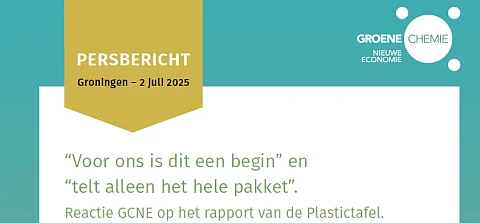GCNE's Response to the Plastictafel Report.
02-07-2025
Today, the Dutch Plastic Table presents the report with its findings. While for some parties at the table, the results represent a maximum, for GCNE these findings are the minimum required to maintain confidence in sufficient market demand in the coming years.

“More substantial measures will be needed to achieve the cabinet's target of a 2 million tons CO2 reduction and 30% circularity by 2030, but this can be a modest first step,” says Marc den Hartog, CEO of ChainCraft and negotiator on behalf of GCNE. Arnold Stokking, chairman of GCNE, adds: “Only if the entire package is adopted by the political landscape can our circular companies turn to the bank. Too many gamechangers have already fallen due to the lack of consistent government policy that enables the necessary transition.”
“Preventing the loss of investments and patents to foreign countries”
The use of sustainable raw materials and high-quality recycling is, according to Arnold Stokking, “essential for further economic growth and the retention of high-quality jobs in the Netherlands.” Den Hartog states: “We need to ensure that we maintain our leading position in the circular economy and facilitate sustainable investments. This is all against the backdrop of a strong growth in the demand for plastic, and a significant European market for circular plastics expected by 2030.” The Netherlands has a robust infrastructure for waste collection and processing and is incredibly innovative, but the Netherlands cannot do it alone. It requires collective and united action towards Brussels and an early start on measures to be ready when the EU introduces legislation and regulation starting in 2030. Previous attempts to achieve results through voluntary agreements with the industry were insufficient, as evidenced by the failure of the Plastic Pact in 2023 and the subsequent PBL report that recommended more “coercion” in the form of a circular plastics standard.
Plastic Roundtable for 30% Circularity by 2030
The Plastic Roundtable was initiated in December 2024 by VNO, Plastics Europe, NRK, and Verpact, created after the cabinet scrapped the proposed plastic tax of half a billion euros per year, as well as the circular plastic standard in April. The cabinet requested the table to come up with alternative solutions to these instruments that would result in a comparable CO2 reduction of 2 million tons and 30% circularity by 2030, while generating fiscal revenue and maintaining a healthy, competitive plastic, waste, and recycling sector. Thanks to the House of Representatives, GCNE was able to participate in the meetings of this table in recent months. Suggestions include a circular plastic bank and rate differentiation within the UPVs. Large companies and retailers are increasingly focusing on sourcing circular plastics. A new and important instrument in this regard is the circular leverage. This leverage aims to reward the use of circular plastics compared to fossil plastics. If legally and enforceably implemented according to the advice of the joint Plastic Roundtable, this is an effective instrument that will lead to a real market for circular plastics in the Netherlands.
Arnold Stokking: “I would like to sincerely thank the chair and all participants at the table for the many hours they have dedicated over the past month. In particular, I thank our team and all the other game changers who have contributed behind the scenes.”
